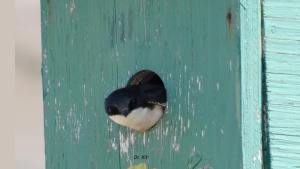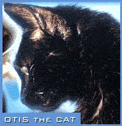Dr. Kathleen Schnaars Uvino—aka “Dr. Kit,” a professor of Biology and Ecology at the University of Jamestown, where she oversees the Tree Swallow Project, which is carried out in two countries: in Jamestown, North Dakota, and in Churchill, Manitoba—discusses her transition from toiling in the corporate world in Manhattan (rising to Director of Technology at Time Warner) before venturing into academia.  Uvino recounts how her interest in studying the Tree Swallow was spurred when a professor/mentor invited her to participate in The Hudson Bay Project, a multi-faceted, multi-species collaborative research program set in the “coastal arctic tundra” of Churchill. Churchill is best known for polar bears that sometimes enter the town—and tourist excursions to see them, as well
Uvino recounts how her interest in studying the Tree Swallow was spurred when a professor/mentor invited her to participate in The Hudson Bay Project, a multi-faceted, multi-species collaborative research program set in the “coastal arctic tundra” of Churchill. Churchill is best known for polar bears that sometimes enter the town—and tourist excursions to see them, as well  as scientific efforts to study them—though viewing beluga whales in the Churchill River also draws visitors and researchers, while the wide array of birds additionally entices birdwatchers and scientists. Uvino recalls that the Tree Swallows there interested her, yet seeing that no research was being conducted on them there, she launched the Tree Swallow
as scientific efforts to study them—though viewing beluga whales in the Churchill River also draws visitors and researchers, while the wide array of birds additionally entices birdwatchers and scientists. Uvino recalls that the Tree Swallows there interested her, yet seeing that no research was being conducted on them there, she launched the Tree Swallow  Project not quite five years ago. She explains that the Tree Swallow is a “model study organism” among scientists like herself, because the birds readily adapt to man-made nest boxes—and she now has 267 next boxes in Churchill (plus a considerably smaller number in Jamestown). Uvino describes the methods of generating and tracking the information of the birds in those boxes, and points out the contrasts in findings her study has yielded from others elsewhere, including in the Northeast, where the nearby agricultural industry—and its use of insecticides—has seen a more precipitous drop in population; the Tree Swallow is an aerial insectivore, meaning it munches on hordes of mosquitos or other biting insects each day (so in areas where insecticides are used, the mosquitos and other bugs contain traces, which harm the tree swallows.) Uvino says that these migratory birds, who fly south to escape the harsh conditions of Churchill winters, engage in “diet switching” upon their return, first eating berries in their initial period back in Churchill, before resuming their menu of insects. (http://www.treeswallowprojects.com) Photo of Dr. Kit by Karen Tweedy-Holmes
Project not quite five years ago. She explains that the Tree Swallow is a “model study organism” among scientists like herself, because the birds readily adapt to man-made nest boxes—and she now has 267 next boxes in Churchill (plus a considerably smaller number in Jamestown). Uvino describes the methods of generating and tracking the information of the birds in those boxes, and points out the contrasts in findings her study has yielded from others elsewhere, including in the Northeast, where the nearby agricultural industry—and its use of insecticides—has seen a more precipitous drop in population; the Tree Swallow is an aerial insectivore, meaning it munches on hordes of mosquitos or other biting insects each day (so in areas where insecticides are used, the mosquitos and other bugs contain traces, which harm the tree swallows.) Uvino says that these migratory birds, who fly south to escape the harsh conditions of Churchill winters, engage in “diet switching” upon their return, first eating berries in their initial period back in Churchill, before resuming their menu of insects. (http://www.treeswallowprojects.com) Photo of Dr. Kit by Karen Tweedy-Holmes

ALSO: I spoke with Dr. Val Beasley, a professor of veterinary, wildlife and ecological toxicology sciences at Pennsylvania State University. He explained how algae in water can poison dogs—like those who died in recent days in North Carolina, Austin, Georgia, and elsewhere, generating considerable media coverage—and how the confluence of factors that led to those dogs dying is often present, and has led to dog deaths, but without the media coverage. Correspondingly, Beasley warns that it’s prudent for dog owners to err on the side of caution, and not allow their animals to swim in ponds, lakes, and other bodies of water, where their may be risky conditions that aren’t visually evident–particularly this time of year. When it sounded as though the chief concern involves standing water—that if the water were circulating or otherwise moving, it might mitigate the risk, Beasley responded that it’s not quite that simple, noting, for example, that the water in rivers can sometimes pose that danger for dogs. (https://vbs.psu.edu/directory/vrb3)
COMEDY CORNER: Jim Gaffigan’s “Dog Birthday” (https://www.jimgaffigan.com)
MUSIC: Rebekah Pulley’s “Talking Animals Theme,” instrumentals
NAME THAT ANIMAL TUNE: We didn’t play “Name That Animal Tune” today.
AUDIO ARCHIVE:
Listen Online Now:



